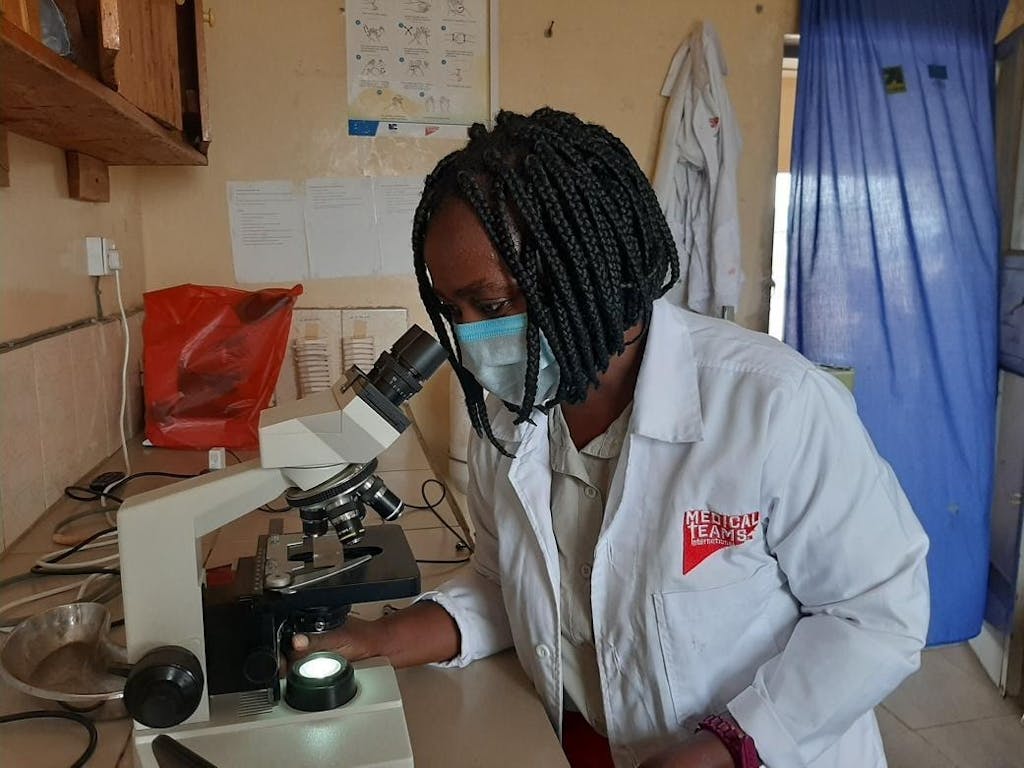More than eight months into the global COVID-19 pandemic, prevention awareness remains more critical than ever. With help from the UN Refugee Agency and the COVID-19 Solidarity Response Fund, lab technologist Lynda Nalumansi helps refugees in Uganda learn more about the virus through a weekly radio show.
By day, Lynda Nalumansi is on the frontlines of the COVID-19 fight as a lab technologist in the Kyaka II refugee settlement in Uganda.
By night, she is once again on the frontlines, this time hosting a radio talk show to answer refugees’ questions about the virus and to keep highlighting the importance of maintaining physical distancing, wearing masks, and engaging in other potentially lifesaving measures.
“While you are out there, around other people, in the market, or at the hospital, or at work, always remember to keep social distance,” she advises on her show.
Since May, Nalumansi has hosted two shows a week at the local Kyegegwa community radio station. She and her team have deployed more than seven languages and dialects — English, Rutooro, Runyankore, Luganda, Swahili, Kinyabwisha, and French — to reach refugee audiences in the community who hail from Rwanda, the Democratic Republic of the Congo, Burundi, and elsewhere.
There are more than 123,000 refugees at Kyaka II, most of whom were forced to flee extreme violence in DRC. While there have been no cases of COVID-19 at Kyaka II, dozens of refugees living in other settlements and towns in Uganda have tested positive for it. This news has made others worried and ask questions about the virus.
In July alone, 70 listeners called in to Nalumansi’s radio show, and she and local health officials answered a total of 102 questions. The questions included concerns about whether it is safe to share masks with a spouse; if a thermometer can be used to check for the virus; whether COVID-19 is sexually transmitted; and logistical questions about where masks can be purchased in the area.
“COVID-19 is real,” Nalumansi tells her listeners. “You need to stay at home if possible, but if you really have to move around, don’t forget to cover your mouth and your nose with a face mask.”
Nalumansi has worked in Kyaka II since 2015, seeing her fair share of cholera outbreaks (29 cases at the settlement in 2018 and 31 in 2019), preventing the Ebola outbreak in eastern DRC from entering Uganda, and now, protecting refugees — and herself — from the new COVID-19 virus.
“There is a fear of exposure amongst health workers, but I have experienced so many different types of outbreaks that I know I just have to remain calm,” she said. “We, as health workers, know that if we are not wearing our personal protective equipment [PPE] that we can get infected, and given our profession we just need to take precaution and take good care.”

Nalumansi demonstrates how the lab technicians she supervises analyze samples at Bujubuli Health Centre II. Photo: UNHCR/Stephanie Perham
Access to PPE and lab supplies is a challenge everywhere in Uganda. Health workers currently have PPE, but items get depleted frequently,” said Innocent Komakech, emergency preparedness focal person at WHO Uganda. “Thankfully, COVID-19 has not yet touched Kyaka II refugee settlement.”
Throughout Uganda, positive cases have risen to more than 2,000 as of August 24; the first case was confirmed on March 21, and while the first death was not recorded until the end of July, more than a dozen deaths have now been registered. The country has been planning for the worst-case scenario, which would be an outbreak in its city slums or within the refugee settlements.
With support from the COVID-19 Solidarity Response Fund, UNHCR has been able to ensure that dedicated workers such as Lynda Nalumansi can continue to prevent the infection and spread of the virus among refugees in Kyaka II while protecting themselves.
“When I joined this profession I thought, ‘This is where I really belong and can contribute,’ and through all of the challenges I’ve faced over the last few years, I still feel the same; even more so,” she said.
This piece has been adapted from content provided by UNHCR and has been edited and published with permission.
In June, at the direction of WHO, UNHCR received $10 million from the COVID-19 Solidarity Response Fund — created by the United Nations Foundation, in partnership with the Swiss Philanthropy Foundation — to support its lifesaving work to combat the pandemic in some of the world’s most vulnerable places.
YOU CAN HELP
Every action counts in the fight against COVID-19. By supporting the COVID-19 Solidarity Response Fund, you can help ongoing efforts to fight the coronavirus and protect the lives of refugees around the world. The Fund is the fastest and most effective way for individuals, companies, and organizations to support the work of the World Health Organization and its partners in battling the virus.
Donate to the COVID-19 Solidarity Response Fund.
This piece was provided by UNHCR’s Stephanie Perham and has been edited and published with permission.



 View All Blog Posts
View All Blog Posts